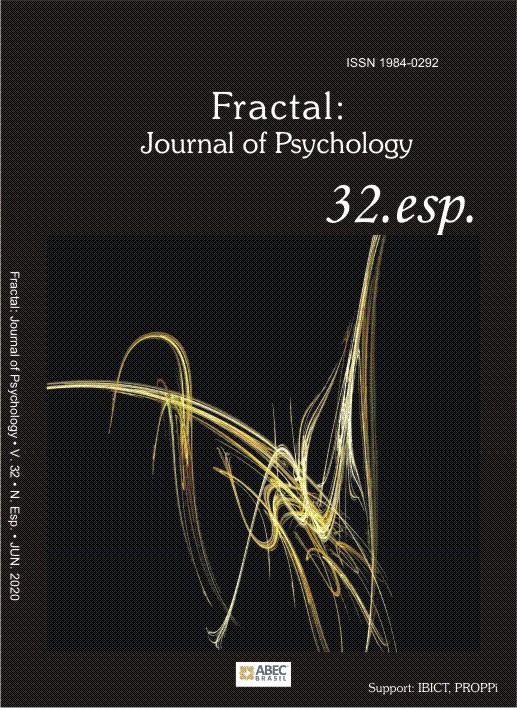Relationship between social skills, stress, age, sex, school type and school grade in adolescents
DOI:
https://doi.org/10.22409/1984-0292/v32_i-esp/39792Keywords:
social skills, stress, teenagers, gender, school typeAbstract
During adolescence many changes occur in adolescent life. They have to develop social skills, behaviors that composes the repertoire of an individual to respond the social demands adequately. They face some situations that can cause stress, which is the reaction of the body to restore its balance after going through stressor situation. The present study aimed to investigate the correlation of social skills and stress variables: sex, age, type of school attended and grade. For this was used Psychological tests ESA (Stress Scale for Adolescents) and IHSA-Del-Prette(Inventory of Social Skills for Adolescents). The obtained results permit to conclude that there is a correlation between stress and the variables gender, age and type of school attended, as well as between the emission of social skills and the type of school attended. The hypothesis that the female students had more social skills than the students was not confirmed, nor it was confirmed that men have more difficulties in issuing the answers than women.
Downloads
References
ARÓN, Ana Maria; MILICIC, Neva. Viver com os outros: programa de desenvolvimento de habilidades sociais. Tradução de Jonas Pereira dos Santos. Campinas: Psy, 1994.
BANDEIRA, Marina et al. Competência acadêmica de crianças do ensino fundamental: características sociodemográficas e relação com habilidades sociais. Interação em Psicologia, v. 10, n. 1, p. 53-62, 2006. http://dx.doi.org/10.5380/psi.v10i1.5773
BARTHOLOMEU, Daniel; NUNES, Carlos Henrique Sancineto da Silva; MACHADO, Afonso Antonio. Traços de personalidade e habilidades sociais em universitários. Psico-USF (Impr.), Itatiba, v. 13, n. 1, p. 41-50, 2008 https://doi.org/10.1590/S1413-82712008000100006
CALAIS, Sandra Leal et al. Stress entre calouros e veteranos de jornalismo. Estudos de Psicologia, Campinas, v. 24, n. 1, p. 69-77, 2007. https://doi.org/10.1590/S0103-166X2007000100008
CÂMARA, Sheila Gonçalves; CARLOTTO, Mary Sandra. Coping e gênero em adolescentes. Psicologia em estudo, Maringá, v. 12, n. 1, p. 87-93, 2007. https://doi.org/10.1590/S1413-73722007000100011
CARVALHO, Alysson; PINTO, Mario V. Ser ou não ser... Quem são
os adolescentes? Navegar é preciso... In: CARVALHO, A.; SALLES, F.; GUIMARÃES, M. (Org.). Adolescência. Belo Horizonte: UFMG, 2002. p. 11-30.
DEL PRETTE, Almir; DEL PRETTE, Zilda Aparecida. Psicologia das relações interpessoais: vivências para o trabalho em grupo. Petrópolis: Vozes, 2008.
DEL PRETTE, Almir.; DEL PRETTE, Zilda Aparecida. Inventário de habilidades sociais para adolescentes: manual de aplicação, apuração e interpretação. São Paulo: Casa do Psicólogo, 2009.
GONZÁLEZ, Miguel Alvarez. Stress: temas de psiconeuroendocrinologia. Tradução de Maria Cristina T. V. Teixeira. 2. ed. São Paulo: Robe, 2001.
GRESHAM, Frank. Análise do comportamento aplicada às habilidades sociais. In: DEL PRETTE, Almir; DEL PRETTE, Zilda Aparecida (Org.). Psicologia das habilidades sociais: diversidade e suas implicações. Petrópolis: Vozes, 2009. p. 17-66.
LIPP, Marilda Emmanuel Novaes (Org.). Stress: conceitos básicos. In: ______. Pesquisas sobre stress no Brasil: saúde ocupações e grupos de risco. Campinas: Papirus, 1996. p. 17-31.
LIPP, Marilda Emmanuel Novaes (Org.). O modelo quadrifásico do stress. In: ______. Mecanismos neuropsicofisiológicos do stress: teoria e aplicações clínicas. São Paulo: Casa do Psicólogo, 2010. p. 17-22.
LIPP, Marida Emmanuel Novaes et al. O estresse em escolares. Psicologia escolar e educacional, Campinas, v. 6, n. 1, p. 51-56, 2002. http://dx.doi.org/10.1590/S1413-85572002000100006
LIPP, Marilda Emmanuel Novaes; PEREIRA, Márcia Bignotto; SADIR, Maria Angélica. Crenças irracionais como fontes internas de stress emocional. Revista Brasileira de Terapias Cognitivas, v. 1, n. 1, p. 29-34, 2005. Disponível em: http://pepsic.bvsalud.org/scielo.php?script=sci_arttext&pid=S1808-56872005000100004. Acesso em: 20 fev. 2019.
MACHADO, Sheila Francisca; VEIGA, Heila Magali da Silva; ALVES, Sérgio Henrique de Souza. Níveis de estresse em alunos de 3ª série do ensino médio. Universitas: Ciências da Saúde, Brasília, v. 9, n. 2, p. 35-52, 2011. http://dx.doi.org/10.5102/ucs.v9i2.1362
OLIVEIRA, Maria Amélia Vallim de. Administrando o stress com técnicas de programação neuroliguísticas. São Paulo: Gente, 1996.
PAPALIA, Dianne; OLDS, Sally Wendkos; FELDMAN, Ruth Duskin. Desenvolvimento humano. São Paulo: McGraw-Hill, 2009.
PIRES, Edna Aparecida Goulart; PIRES, Mário César; PETROSKI, Edio Luiz. Adiposidade corporal, padrão de comportamento e estresse em adolescentes. Revista Brasileira de Cineantropometria e Desempenho Humano, Florianópolis, v. 4, n. 1, p. 7-16, 2002.
POLO, Antonia; LOPEZ, José Manuel Hernández; POZA, Carmen. Evaluación del estrés académico en estudiantes universitarios. Ansiedad y Estrés, Espanha, v. 2, n. 2-3, p. 159-172, 1996. Disponível em: https://pt.scribd.com/document/39788022/Estres-Academicos-en-Estudiantes-Universitarios. Acesso em: 12 ago. 2019.
RIBEIRO, Marco Aurélio de Patrício; RIBEIRO, Luis Távora Furtado. Estresse: conhecer para superar. Petrópolis, RJ: Vozes, 2005.
SALLES, Leila Maria Ferreira. Adolescência, escola e cotidiano: contradições entre o genérico e o particular. Piracicaba: UNIMEP, 1998.
SANTOS, André Faro; ALVES JÚNIOR, Antônio. Estresse e estratégias de enfrentamento em mestrandos de ciências da saúde. Psicologia: Reflexão e Crítica, Porto Alegre, v. 20, n. 1, p. 104-113, 2007. https://doi.org/10.1590/S0102-79722007000100014
SELYE, Hans. Stress: a tensão da vida. Tradução de Frederico Branco. São Paulo: IBRASA, 1965.
TRICOLI, Valquíria. Escala de stress para adolescentes. São Paulo: Casa do Psicólogo, 2005.
ZIMPEL, Rogério. Aprendendo a lidar com o estresse. São Leopoldo: Sinodai, 2005.
Downloads
Published
How to Cite
Issue
Section
License
Authors publishing in this journal agree to the following terms:
- Authors retain copyright and grant the journal the right of first publication, with the work simultaneously licensed under the Creative Commons Attribution License allowing sharing of the work with acknowledgement of authorship of the work and initial publication in this journal.
- Authors are permitted to enter into additional contracts separately for non-exclusive distribution of the version of the work published in this journal (e.g., publishing in an institutional repository or as a book chapter), with acknowledgment of authorship and initial publication in this journal.

This work is licensed under a Creative Commons Attribution 4.0 International License.
To the extent possible under the law, Fractal: Journal of Psychology has waived all copyright and related rights to the Reference Lists in research articles. This work is published in: Brazil.
To the extent possible under law,Fractal: Journal of Psychology has waived all copyright and related or neighboring rights to Reference lists in research articles. This work is published from: Brazil.







